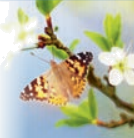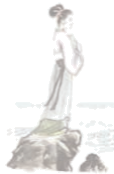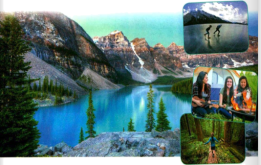

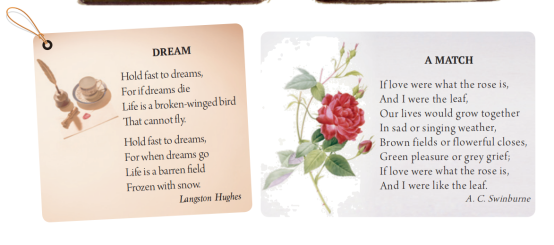
Wind on the Hill | Dream | A Match | |
| Subject | |||
| Images | |||
| Rhymingwords | |||
| Rhetorical devices |
Expressing feelings and emotions
□It was fantastic! □How wonderful! □How exciting!
□That’s amazing. □It was great fun! □It’s very exciting.
□It was great to... □I’m really happy that... □I’m pleased to...

Good morning! My name is Sarah Williams. It’s an honour to be here and to share with you the story of how music has had an impact on my life.
(A) Have you ever faced a time when things looked dark and you had no hope at all? Two years ago, I was told I had a serious disease which was difficult to cure. My body ached all the time and thus I thought I didn’t have much longer to live. I was very afraid and I felt so alone and discouraged. Then one day, I had to go through a two-hour medical treatment. The doctor wanted me to relax, so he had me listen to some music, and one of the songs was “Happy”. The song made me feel so much better that from then on I began to listen to music all the time. (B) John A. Logan said, “Music is the medicine of the mind.” And it’s true. Music helped me recover.
(C) Music gave me happiness. When I listened to music, (D) it made my spirits fly like a kite in the wind. (C) Music gave me strength and brought me relief. (E) It was the rock I leant on to become strong and to get through those hard times. Moreover, (C) music gave me hope and a sense of satisfaction. (F) It became my best friend. It spoke words of encouragement to the deepest part of my being.
Of course, I hope none of you have to go through the same kind of suffering that I did. At the same time, we all go through various periods when we feel sad or alone. During those times, music can help you in the same way that it helped me. I hope all of you will somehow begin to treasure music and make it a part of your life.
Thank you!
1. Reading for informationRead the speech and answer the questions.
(1) What was Sarah’s problem?
(2) How did music help her during her difficult time?
(3) What is her advice to others?
2. Reading for structure
Read the speech again and figure out the structure.
3. Reading for language features
Match the names of rhetorical devices to the lettered sentences in the speech.
metaphor
personification
quote
repetition
rhetorical question
simile
Discuss these questions in groups and then fill in the table.
What festivals do you celebrate with your family each year?
Why do you think people celebrate different festivals?
| Names of the festivals | Reasons for celebrating the festivals |
1. Have you ever written a poem before? If so, what did you write about?
2. What might inspire you to write poems?

2. Do you know where it usually happens?
3. What festival does this picture reflect?
9 . A FEW SIMPLE FORMS OF ENGLISH POEMS
There are various reasons why people compose poetry. Some poems tell a story or describe a certain image in the reader’s mind. Others try to convey certain feelings such as joy and sorrow. The distinctive characteristics of poetry often include economical use of words, descriptive and vivid language, integrated imagery, literary devices such as similes and metaphors, and arrangement of words, lines, rhymes, and rhythm. Poets use many different forms of poetry to express themselves. Now we will look at a few of the simpler forms.
Some of the first poems a young child learns in English are nursery rhymes. They are usually the traditional poems or folk songs. The language of these rhymes, like Poem A, is to the point but has a storyline. Many children enjoy nursery rhymes because they rhyme, have a strong rhythm, and often repeat the same words. The poems may not make sense and even seem contradictory, but they are easy to learn and recite. By playing with the words in nursery rhymes, children learn about language.
One of the simplest kinds of poem is the “list poem”, which contains a list of things, people, ideas, or descriptions that develop a particular theme. List poems have a flexible line length and repeated phrases which give both a pattern and a rhythm to the poem. Some rhyme (like B and C), while others do not. Another simple form of poem that amateurs can easily write is the cinquain, which is made up of five lines. With these, you can convey a strong picture or a certain mood in just a few words. Look at the example (D).
Haiku is a Japanese form of poetry that consists of 17 syllables. It has a format of three lines, containing 5, 7, and 5 syllables respectively. It is not a traditional form of English poetry, but is very popular with English writers. It is easy to write and, like the cinquain, can give a clear picture and create a special feeling using very few words. The haiku poem (E) on the right is a translation from Japanese, which shows a moment in the life of a delicate butterfly.
English speakers also enjoy poems from China, those from the Tang Dynasty in particular. A lot of Tang poetry has been translated into English, such as this one (F).
With so many different forms of poetry to choose from, you may eventually want to write poems of your own. Give it a try!
| A | Hush, little baby, don’t say a word, Papa’s gonna buy you a mockingbird. If that mockingbird won’t sing, Papa’s gonna buy you a diamond ring. If that diamond ring turns to brass, Papa’s gonna buy you a looking glass. If that looking glass gets broke, Papa’s gonna buy you a billy goat. If that billy goat won’t pull, Papa’s gonna buy you a cart and bull. |
|
| B | Only One Mother Hundreds of stars in the pretty sky, Hundreds of shells on the shore together, Hundreds of birds that go singing by, Hundreds of lambs in the sunny weather. Hundreds of dewdrops to greet the dawn, Hundreds of bees in the purple clover, Hundreds of butterflies on the lawn, But only one mother the wide world over. George Cooper |
|
| C | LIFE Life can be good,Life can be bad, Life is mostly cheerful, but sometimes sad Life can be dreams, Life can be great thoughts Life can mean a person, Sitting in court. |
|
| D | Brother Beautiful, athletic Teasing, shouting, laughing Friend and enemy too Mine |
|
| E | A fallen blossom Is coming back to the branch. Look, a butterfly! |
|
| F | Where she awaits her husband On and on the river flows. Never looking back, Transformed into stone. Day by day upon the mountain top, wind and rain revolve. Should the traveller return, this stone would utter speech. Wang Jian |
|
| Type of poem | Characteristics | Example | Topics and poetic devices |
| Nursery rhyme | • concrete but creative language | A | • love between father and baby • rhymes, repetition |
| List poem | B | ||
| C | |||
| Cinquain | D | ||
| Haiku | E | ||
| Tang poem | F |
WHAT’S IN A NAME?
The United Kingdom, Great Britain, Britain, England-many people are confused by what these different names mean. So what is the difference between them, if any? Getting to know a little bit about British history will help you solve this puzzle.
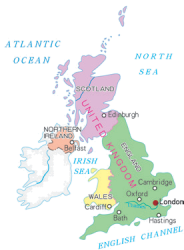
In the 16th century, the nearby country of Wales was joined to the Kingdom of England. Later, in the 18th century, the country Scotland was joined to create the Kingdom of Great Britain. In the 19th century, the Kingdom of Ireland was added to create the United Kingdom of Great Britain and Ireland. Finally, in the 20th century, the southern part of Ireland broke away from the UK, which resulted in the full name we have today: the United Kingdom of Great Britain and Northern Ireland. Most people just use the shortened name: “the United Kingdom” or “the UK”. People from the UK are called “British”, which means the UK is also often referred to as Britain or Great Britain.
The four countries that belong to the United Kingdom work together in some areas. They use the same flag, known as the Union Jack, as well as share the same currency and military defence. However, they also have some differences. For example, England, Wales, Scotland, and Northern Ireland all have different education systems and legal systems. They also have their own traditions, like their own national days and national dishes. And they even have their own football teams for competitions like the World Cup!
The United Kingdom has a long and interesting history to explore, which can help you understand much more about the country and its traditions. Almost everywhere you go in the UK, you will be surrounded by evidence of four different groups of people who took over at different times throughout history. The first group, the Romans, came in the first century. Some of their great achievements included building towns and roads. Next, the Anglo-Saxons arrived in the fifth century. They introduced the beginnings of the English language, and changed the way people built houses. The Vikings came in the eighth century, left behind lots of new vocabulary, and also the names of many locations across the UK. The last group were the Normans. They conquered England after the well-known Battle of Hastings in the 11th century. They had castles built all around England, and made changes to the legal system. The Normans were French, so many French words slowly entered into the English language.
There is so much more to learn about the interesting history and culture of the United Kingdom. Studying the history of the country will make your visit much more enjoyable. The capital city London is a great place to start, as it is an ancient port city that has a history dating all the way back to Roman times. There are countless historic sites to explore, and lots of museums with ancient relics from all over the UK. The UK is a fascinating mix of history and modern culture, with both new and old traditions. If you keep your eyes open, you will be surprised to find that you can see both its past and its present.
| When? | What happened? | What changed? |
| Romans arrived | ||
| Anglo-Saxons came | ||
| Vikings came | ||
| 11th century | ||
| 16th century | / | |
| 18th century | ||
| 19th century | ||
| 20th century |





